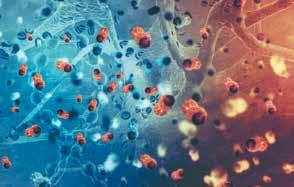
3 minute read
Spotlight on penile cancer
What is penile cancer?
The penis is part of the male reproductive and urinary systems. Penile cancer is a disease where (cancer) cells form in the tissues of the penis. Most penile cancers are squamous cell carcinomas (cancer that begins in flat cells lining the penis).
The stats*
Penile cancer is rare. In 2020 there will be an estimated 136 cases of penile cancer diagnosed and an estimated 24 deaths from this disease. In 2012–2016, on average, 73.8% of males diagnosed with penile cancer survived 5 years after diagnosis. And it is estimated that in 2020 males will have a 1 in 1,391 (or 0.0719%) risk of being diagnosed with penile cancer by the age of 80.
136 men It is estimated will be affected by penile cancer in Australia in 2020.
Penile cancer symptoms
Colour changes, bumps or thickening of the skin can be signs of penis cancer. Other symptoms can include discharge or bleeding.
These and other symptoms may be caused by penile cancer. Other conditions may cause the same symptoms. Check with your doctor if you have any of the following problems:
•Redness, irritation, or a sore on the penis •A lump on the penis
Risk factors for penile cancer
Infection with human papilloma virus is a risk factor for cancer of the penis. Some other conditions that affect the appearance of the skin of the penis can lead to cancer, so it’s important to see your doctor if you notice white, red or scaly patches.
Other risk factors for penile cancer include: •Being age 60 or older
Having phimosis (a condition in which the foreskin of the penis cannot be pulled back over the glans) •Having poor personal hygiene •Having many sexual partners •Using tobacco products
Spotlight on penile cancer
Who treats penile cancer?
Based on your treatment options, you might have different doctors of various specialties on your treatment team. These doctors could include:
A urologist: a surgeon who specialises in diseases of the male genitals and urinary tract
A radiation oncologist: a doctor who uses radiation to treat cancer
A medical oncologist: a doctor who uses chemotherapy and other medicines to treat cancer
A psychologist trained in sex therapy: a specialist who can help patients and their partners discuss their feelings around intimacy and sexual well-being
How is penile cancer treated?
Surgery is the main treatment for most men with penile cancers, but sometimes radiation therapy may be used, either instead of or in addition to surgery. Other local treatments might also be used for early-stage cancer. Chemotherapy may be given for some larger tumours or if the cancer has spread.
As well as medical treatment for penile cancer it is also important to adjust to living with the diagnosis. A specialist nurse, psychologist, social worker, a GP and support groups can all help and provide ways of coping.
Thinking about taking part in a clinical trial
Progress in treating penile cancer has been hindered by its rarity so it is difficult to recruit enough patients to penile cancer clinical trials.
Clinical trials are carefully controlled research studies that are done to get a closer look at promising new treatments or procedures. Clinical trials are one way to receive state-of-the art cancer treatment, management and care that is not yet available to the wider public. Clinical trials are also the best way for a multidisciplinary team to learn better methods to treat this rare form of cancer.
If you would like to learn more about clinical trials that might be right for you, start by asking your doctor or contact ANZUP.

Although penile cancer is a relatively rare disease, its consequences are profoundly life changing for the men who develop it. Evidence supports the view that factors such as embarrassment, fear, the potential impact on sexuality and a cancer sited in a sexual organ all impact on patients’ help-seeking behaviours, resulting in a delay in presenting to a healthcare professional.
References
*https://www.aihw.gov.au/reports/cancer/cancer-data-in-australia/contents/summary ** What are the unmet supportive care needs of men and their loved ones affected by penile cancer? A systematic review of the empirical evidence. Presenter and lead: Associate Professor Catherine Paterson https://www.anzup.org.au/docview.aspx?id=1029









